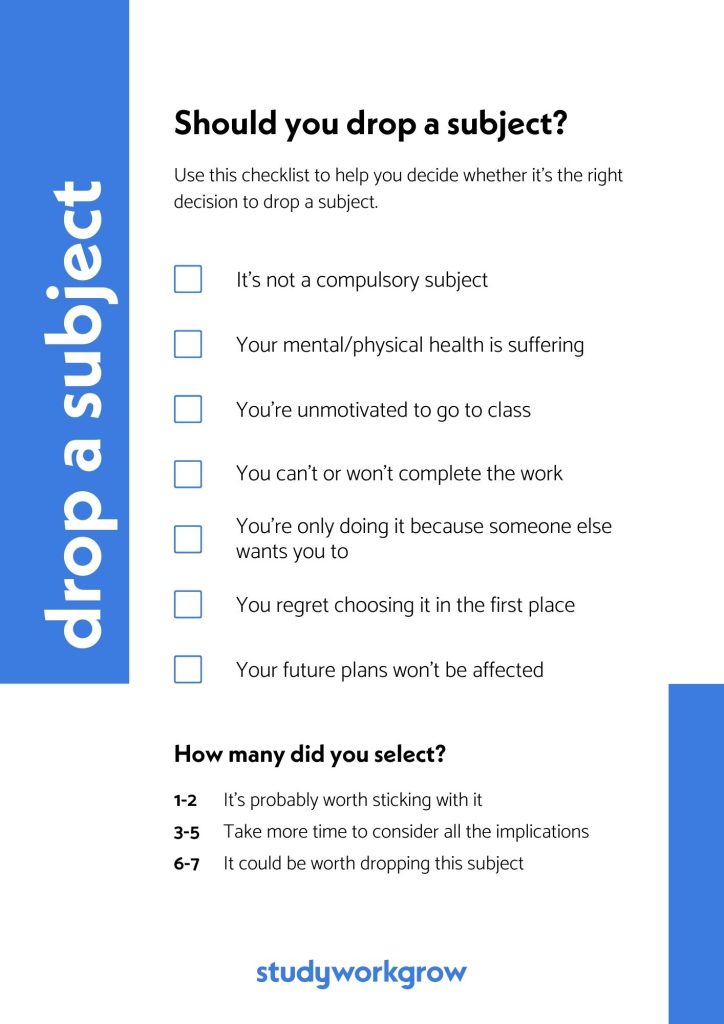Whether you’re in senior high school or just starting at university, study can be tough – you’re busy with classes, extracurriculars, and maybe even working part-time too. You might also be starting to live independently, expected to do more at home, and then there’s all the life admin you suddenly have to deal with…and we haven’t even mentioned keeping up your social life yet! So it’s understandable that with everything going on, you could be tempted to drop a subject. But should you?
Let’s go through some of the pros and cons of dropping a subject, plus some questions to ask yourself first to make sure it’s really the best decision for you.
First things first – why do you want to drop a subject?
If you’re considering dropping a subject, be honest with yourself about the real reason behind your decision. Here are some of the most common reasons we see students dropping subjects:
- They’re overwhelmed with too many subjects
- It’s not what they expected it would be
- They really don’t like the subject
- They’re struggling to keep up academically
- They changed their mind about their future pathway
- Their personal situation has changed and study is less of a priority
All of these are perfectly valid reasons, but in most cases, there are other things you can do first to ease the burden without having to go to the extreme of dropping the subject entirely. If any of the above sound like you, here’s what we recommend you do first.
Take some time to reflect
Dropping a subject is a big step and shouldn’t be taken lightly. Once you know why you want to drop a subject, the next step is to reflect on how doing so will benefit you.
- Will it give you more time to focus on other subjects or personal commitments?
- Will it improve your mental or physical health?
- Will it open up more future opportunities?
- Will it help you enjoy school/university more?
Be realistic and consider the chances of your perceived outcomes actually happening. For example, if you want to drop a subject because it might help you focus more on your other subjects, will you really dedicate the extra time to your studies? Or will you just fill the gap with video games and sleep?
Talk to someone you trust
Take a little time and talk to a trusted adult (such as a teacher/lecturer, counsellor, or family member) about your decision. You might be surprised at what other support is available to make your studies easier.
Important things to consider
If you do want to drop a subject, here are some important things you should keep in mind before making a final decision.
Will you still be able to graduate?
Before you do anything else, it’s really important to check that you will still be eligible to graduate (either from high school or from your degree).
If you’re in high school, you should talk to your teachers or a guidance counsellor and find out exactly how many subjects you need to complete in order to receive your high school certificate. You may also need to discuss whether any changes will affect your eligibility for university entrance down the track.
If you’re at university, discuss any potential subject changes with the student support team. Carefully check how many subjects or credits you need in order to complete your degree. Make sure you’re aware of any key dates regarding course/subject payments, and whether or not you will still need to pay for the subject even if you drop out.
Is dropping the subject even possible?
As a high school student, there are some subjects that everyone must complete, such as English and Maths. If you find you’re struggling in an essential subject, you might need to discuss potentially changing to a lower level or finding extra study support, as dropping them entirely is not an option.
At university too, there are usually a set of “core” subjects you must take as part of your degree – so even if you drop one now, you may need to re-take it at some point in the future anyway. Many subjects also act as prerequisites for future subjects, so skipping one may affect your future enrolment too.
Reasons you probably should drop a subject
While there are many reasons to stick with a subject, you might be surprised to hear that there are also some very compelling reasons to drop it too.
- You’ve changed your mind about your future pathway or career. This is probably one of the best reasons to drop a subject and change it to something else. There’s no point slogging through a subject you’re not even going to use – plus, you don’t want to miss any prerequisites to your new pathway.
- You really, really hate the subject. This one might come as a bit of a surprise, but think logically – if you can’t stand the subject that much, do you really want to spend the rest of your life in a career doing something you hate?
- You’re only doing it because someone else thinks you should. Whether it’s because you wanted to be in the same class as your friends or it’s the degree your parents wanted you to do, you should never have to do something you hate or miss out on what you really want just because of someone else.
- Your health is being negatively affected. We know school is important, but nothing is as important as your health. If you find yourself really struggling, mentally or physically, and you have exhausted your other options, dropping a subject might be what’s best.
At the end of the day, being in subjects you actually enjoy is likely to make you less stressed and improve your academic performance.
Before making the final decision
Like we mentioned earlier, unless you have a really good reason, dropping a subject is usually the very last solution – there are other steps you can take first that might help.
- First, can you get more help? Speak to your teacher/lecturer to let them know you’re struggling, and they may be able to help you get back on track. You might also like to consider external academic support, such as a tutor.
- Second, do you have a backup plan? What if you change to a different subject and end up hating it or struggling just as much? Or if you need to make up extra credits somehow, can you take intensive classes during the semester break?
- Lastly, are you doing it for the right reasons? Sometimes in life there are just things we have to do, even if we don’t really like it. The subject won’t last forever, and knuckling down and getting it done now can ensure you don’t lock yourself out of any potential future pathways (plus, just think of how good it will feel when it’s finally over and you can celebrate!).
How to drop a subject
Gone through all the above and are still set on dropping a subject? That’s totally OK. Sometimes it really is the best option – and even if you change your mind down the track, there are always options to help you catch up on anything you might have missed.
If you’re a high school student, talk to your school – they’ll have all the information to help you understand the next steps, know if it will be recorded on your school transcripts, and can tell you what (if any) implications there may be for your high school certificate or future study options. Your school will probably have a procedure in place you need to follow, and they’ll be there to support you with that.
If you’re a university student, get in touch with student support to ask about withdrawal procedures. They will be able to guide you through the process and let you know if it will be recorded on your academic transcript, or if there are outstanding fees you still need to pay. They can also provide advice on whether you can withdraw under special circumstances without penalty, for example in cases of serious illness or family bereavement.
Lastly, don’t forget to make the most of your extra time and do your best with your remaining subjects.
Still not sure what to do?
Download the checklist below and see how you go – it could help you to make up your mind.
You can also find heaps more blogs on study and pathways on our website here.



